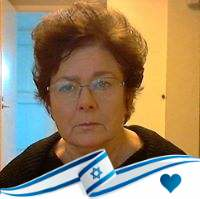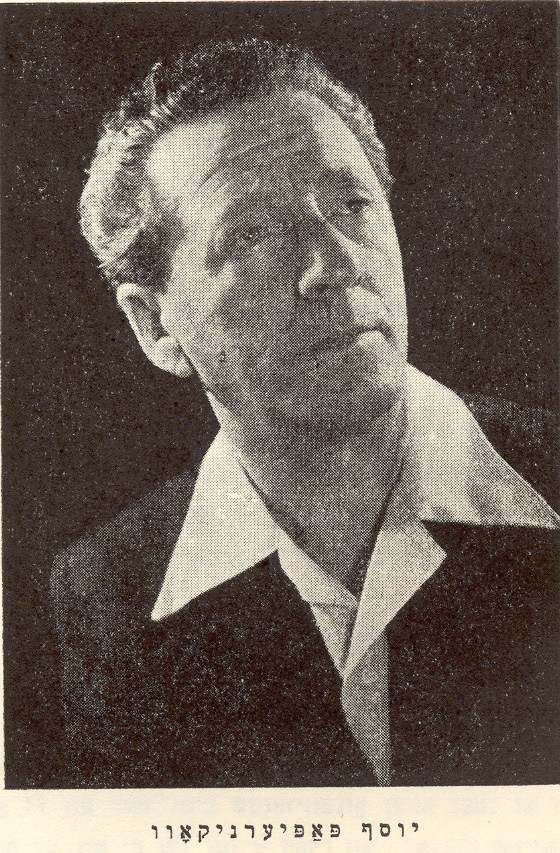 Jewish poet for whom it existed only Jewish language. 1897-1997
Jewish poet for whom it existed only Jewish language. 1897-1997
Lola Piasecka
 Yosef Papirnikov.
Yosef Papirnikov.
My grandmother’s brother, Josel Papiernikov, was born 1897, brought up and educated in Warsaw. During the time when he went to elementary Jewish school, “kheder”, he was send – as a complement – for five years to sing in a choir that was accompanied by a very famous cantor Gershon Sirota, in Warsaw’s principal synagogue. Later he attended a Jewish gymnasium – upper secondary school.
My uncle’s literary activity began in Warsaw in 1918. His poems were very popular in Yiddish speaking circles everywhere. In many of his early poems he underlined the difference between the Diaspora Jews and those of present days Israel.
He left for Israel to settled, as early as 1924. But in 1929, following the pogroms perpetrated by Arabs against Jews, he returned for a short while to Poland. In 1933 my uncle returned to Israel to stay there forever, he has been living there to his death in 1997.

“Zol Zein or So be it”
[ Translated by Samuel Sorgenstein, his cousin – a great translator. ]
So be it that I build my castles in the air,
So be it that my God does not even exist, –
In reverie everything seems brighter,
In reverie it is so much better,
In my dreams the sky is bluer than blue.
So be it that I shall never reach my goal,
So be it that my ship will not reach the shore, –
I care not about arriving,
I care only about walking along a sunny road.
Uncle Josef sad himself in one of interview’s about this poem:
“I believe that what caused my poem to become transformed into a folksong was not so much the text as the musical motive which I composed without being able to lay claim to professional musicianship…..
Thanks to the musical motive…., the poem “Zol Zein” –to my own astonishment- attained considerable popularity; it found its way into hearts of the people much sooner than its appearance in print.
The rapid dissemination of this song of mine, from ear to ear, helped indeed, to create the impression that it was rather successful “bastard” or orphan who never knew the father.” (A reference to the prevailing notation of the anonymity of the author of this poem.)
Uncle was telling me about thirties, during his short visit in Poland while on tour through Jewish communities there, he heard everywhere, in large cities and small towns, the song “Zol Zain”. It was sung by the entire Jewish youth which was permeated with romanticism and longing. They belonged to various political parties beginning with the extreme right and ending with the extreme left. And, he always added to the story: “the curious thing about it was that many of these people, on all kinds of private or official occasion, sing this song of mine for my exclusive benefit – in order to entertain me with something which I surly never heard in Israel.”
Many comments of his song emanating from Jewish communities everywhere reached him in Israel. Following the Nazi onslaught, Jewish repatriates from the Soviet Union reported that they heard this song of his in the remotest Siberian labor camps.
According to statements from survivors of the German death camps in Poland, “Zol Zein” had been sung even there.
Speakers at political rallies, even one Israeli Minister, in a speech delivered in the Knesset, have quoted the last two lines – “I care not about my arrival,/ I care only about walking along a sunny road…”
This poem has many translations from Jewish to Hebrew, but according to my uncle, none of them was successful.
As far as I know, my uncle published eleven volumes of poems, short stories, memoirs. He was perhaps the last master of Jewish language. He wanted to preserve this old language of Diaspora Jews alive, beautiful and reach.
He received many literary prices, among them in 1984 price of International Literary Zionist Organization for all years of creating poems for each generation, for remaining young in his creativeness and that his haven is still “bluer than blue” and that his poetry reach everybody’s homes and become property of the people.
He wrote about realities of everyday living; he use to say on literary evenings in Tel-Aviv to his friends: “If we could breathe with the worm air of our own made bread, if the aroma around us of dew, stink of dunk, stud, we would sing, my brothers, differently, we would listen differently…”.He felt need of staying in near contact with ordinary people, and that, among many other things, gave deep, honest sentiment.
I will never forget his eyes; “bluer than blue” when he hold my hand walking on the street and explaining things to me and above all talking about love for everything.
In his interpretation a poem, a song is a child of love and – hate, child singing on a broad street where even word like love and happiness sounds sad.
Chava Alberstein – yiddish song – Zol Zayn חווה אלברשטיין – זאָל זײַן
Zawartość publikowanych artykułów i materiałów nie reprezentuje poglądów ani opinii Reunion’68,
ani też webmastera Blogu Reunion’68, chyba ze jest to wyraźnie zaznaczone.
Twoje uwagi, linki, własne artykuły lub wiadomości prześlij na adres:
webmaster@reunion68.com
